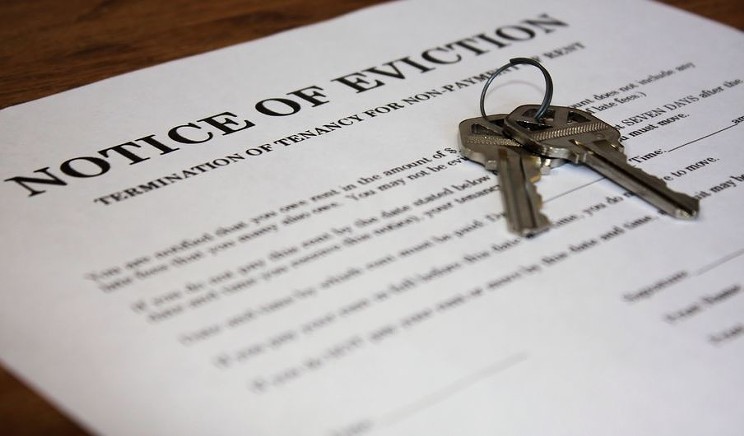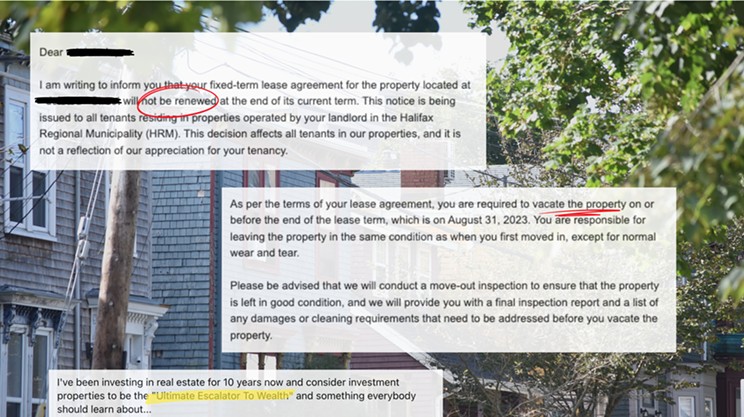Renters in Nova Scotia are paying close attention to amendments to the Residential Tenancies Act announced last Friday. So is the Dalhousie Legal Aid Clinic. The last in their Eviction Prevention Summer Workshop Series is happening Sep. 26, is free and open for registration here.
The workshop series is “a way of engaging tenants, community service providers and other community groups in the process of Residential Tenancies,” says Sydnee Blum, community legal worker and eviction prevention coordinator at the Legal Aid clinic. They say 90% of the issues the clinic hears are about Residential Tenancies—the provincial legislation governing landlords' and tenants' rights and responsibilities—and that much of its work is informed by how people gain access to justice and legal counsel.
Blum points to a 2016 study, Everyday Legal Problems and the Cost of Justice in Canada. It concluded that “60 percent of people reach out to family and friends before reaching out to any sort of legal information service, if they do that at all,” says Blum. This means that rather than legal clinics working as “the front lines for legal questions, it’s people in the community.”
Therefore, the workshop series is designed to “increase community capacity and knowledge around Residential Tenancies, so that when issues do come up or people are asked about them, they can give accurate information—and hopefully, we can all play our part to reduce the number of evictions happening in this province.”
Although this particular series of workshops is ending Sep. 26, Blum encourages anyone to reach out to them directly by email at [email protected] and arrange for Blum to host a workshop wherever needed, for example for student groups, community groups or others.
Also, the DLAS hosts open and free social justice intake clinics Tuesdays 9:30am-12pm, and Thursdays 1-3:30pm at the clinic’s 5746 Russell Street location in Halifax’s north end. Blum says that anyone facing immediate eviction or homelessness can call the clinic at 902-423-8105 and they will prioritize speaking with and connecting those people with the necessary services.
Ideally things don’t reach the point of emergency. An eviction is “the last stage of a longer-term problem between a landlord and a tenant,” says Blum, “and the sooner that we can do that early intervention, and the sooner that we can train people to spot red flags, the easier it's going to be to avoid getting to the eviction process, or avoid getting to such an extreme dispute.”
But some of the changes announced last week seem designed to put timing pressure on difficult situations. Among the new amendments to both the Interim Residential Rental Increase Cap Act and the Residential Tenancies Act proposed Friday are shortened timelines for landlords to issue eviction notices following unpaid rent—down from 15 to three days—and shortened time for renters to respond to these notices—down from 15 to 10. Meanwhile, the rent cap introduced at the height of the pandemic will be extended: landlords can increase rent by a maximum of five percent per year until Dec. 31, 2027.
People can enter rental arrears for all kinds of reasons and for those who wish to fight their evictions, Blum said reaching out to DLAS for help “can usually take a number of days from the time they’re served with an eviction notice.” But now, “what these amendments have done is effectively halving the amount of time that someone has—not even just to challenge the eviction, but to reach out to us.”
This adds “extra pressure and urgency to service providers who are, frankly, already overburdened with the magnitude of this housing crisis,” says Blum. The feeling is “panic and concern,” which “makes it all the more urgent for people to reach out to us when a problem arises and not to wait.”
Colton LeBlanc, the minister of Service Nova Scotia and Internal Services who announced the amendments Friday, also said the government would not create a residential tenancies enforcement unit to resolve disputes between landlords and tenants, as DLAS and other advocacy groups have been pushing for.
In a memo released Friday in response to LeBlanc, the DLAS said these “legislative amendments will increase evictions into homelessness.” The memo said the new amendments “prioritize the interests of landlords by allowing [them] to increase rents above the rate of inflation and make it easier to evict tenants behind on their rent.”
The DLAS memo Friday also took aim at the idea of balancing out shortened eviction timelines with a rent cap extension. The memo pointed out that the five percent increase is “the highest cap on rental increases in the country…[and] is also far above Nova Scotia’s current inflation rate, which slowed to 3.5% year over year in June 2024, as well the bank of Canada’s projected inflation target of 2%.”
As for more expected changes coming to fix or deepen the housing crisis, Blum says there are issues, like fixed-term leases, “that are so glaring, so pressing and so widespread right now that I can't imagine that the government would be able to ignore that for much longer,” adding the shortened eviction timeline amendment “when we have a crisis of homelessness” took them by surprise.
“In my living memory, this is the worst I've ever seen the housing crisis,” say Blum. “The situation has just been deteriorating, and every week, there's a lack of movement from the government, and it gets worse for renters.”
However, Blum is optimistic about one thing: that advocacy and pressure on the government can still bring changes to the legislature “that will actually help tenants.”




